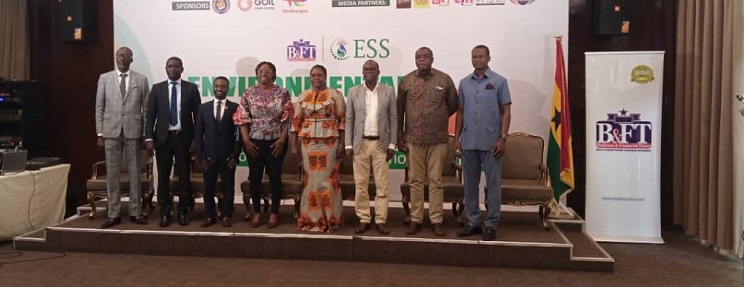
Deforestation, land degradation and climate change are fundamental threats to economic stability of the country, the Minister of Lands and Natural Resources, Samuel A. Jinapor, has said.
He said there was the need for thoughtful management, prudent investments and technological innovation from both the public and private sector players in the country.
MrJinapor said this in a speech read on his behalf by MrBenito Owusu-Bio, Deputy Minister of Lands and Natural Resources at the maiden Environmental Sustainability Summit organised by the Business & Financial Times in Accra on Wednesday.
The day’s programme, sponsored by GOIL, NPA and TotalEnergies was on the theme “The socio-economic impact of pollution on natural life.”
It, among others, sought to create environmental sustainability awareness and explore the socio-economic impact of environmental pollution on natural life.
MrJinapor who delivered the keynote address called on business leaders and policy makers, academicsand stakeholders in the country to collaborate to promote environmental sustainability to promote the economy and businesses.
“Indeed, in this ever-evolving global competitive economic and business environment, business leaders and policymakers need to understand that the issues of pollution of any kind, deforestation and land degradation, and climate change are fundamental threats to economic stability of the country,” he said.
The Minister said Ghana, like many other countries, faced almost all types of environmental pollution, mostly air, water and land pollution, exacerbating climate change, stressing science, data and events at both national and global levels indicate that the earth’s climate was changing.
“Though we are already experiencing the effects of climate change, in the coming decades, these impacts will affect natural resources, livelihoods, and food and water security in significant, but highly uncertain ways,” MrJinapor, said.
He said the government had taken a number of initiatives to combat environmental pollution and promote environmental sustainability in the country, namely the Green Ghana Project launched last year under which more than 30 million trees had been planted between this and last year, Ghana Cocoa REDD+ Programme, the Shea Landscape Emission Reduction Programme.
MrJinapor commended the Business & Financial Times for creating the platform to discuss issues of environmental sustainability and highlight pragmatic policy interventions and investments by the government to promote environmental sustainability.
The Ambassador of the Kingdom of the Netherlands to Ghana, JeroenVerheul, called on Ghana to adopt renewal energy to facilitate the country’s development.
He said the country should transition from fossils to renewable energy in the country’s energy mix, indicating that currently fossils constituted 70 per cent of the country’s electricity production with the remaining coming from renewable sources.
“Ghana does not use coal but it stands to reason that phasing out fossil fuels in favour of renewables will also be beneficial to the economy and the environment,” Ambassador Verheul, said.
The Chief Corporate Communications Officer of Jospong Group of Companies, Sophia Kudjordzi, in a panel discussion said the country could rely on waste to create a lot of businesses through recycling.
According to her, out of the 800,000 metric tonnes of plastic waste generated in the country annually, only 10 per cent were recycled.
MrsKudzordzi called on the government to support the private sector and create an enabling environment for the private sector to invest in recycling to promote environmental sustainability.
The Chief Corporate Communications Officer said the Jospong Group was investing in waste recycling plants across the country to process waste to useful products to address the environmental challenges facing the country.
The Chief Executive Officer of Business and Financial Times, Dr Godwin Acquaye, said political issues and discussions had taken precedent over environmental issues.
He said the recent floods following in parts of the country following rainfall were signs of climate change.
DrAcquaye said there was the need for the media to focus on environmental issues, hence the decision of the Business and Financial Times to organise the Environmental Sustainability Summit to create a platform for policymakers, academic and private sector to discuss the problem and proffer solutions to it.
BY KINGSLEY ASARE






